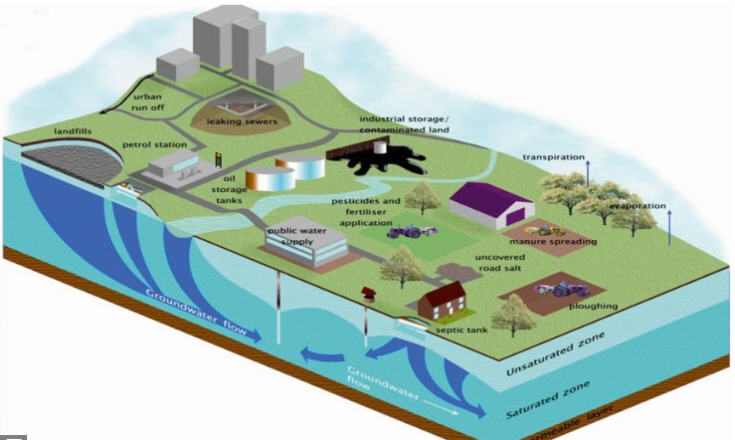|
The
Courses
1. An OSHA Trilogy
2. Applied Volume Calculations
3. Arithmetic
4. Caustic Soda
5. Chemistry Unit I
Chemistry in a Modern World
6. Chemistry Unit II
The Organization of Chemistry
7. Chemistry Unit III Water
and It's Elements
8. Chemistry Unit IV Chemical
Calculations
9. Chemistry Unit V
Ionization
10. Coagulation
and The Lamella Separator
11. Diesel Engine,
The
12. Electrodialysis
13. Filtration
14. Flow
Measurement
15.
Groundwater Pollution,
Remediation & Groundwater Sampling Guidance
16.
Health
and Safety
17. Hydraulics and
Electricity
18. Membrane
Technology
19. Nitrification/ Denitrification
20. Pandemic
21. pH
Measurement
22.
Physical/Chemical Treatment of Industrial Wastewater
23. Plating
24. Pumps
25. Reduction/Oxidation
26. Rules and Regulations
27. Sewage Treatment
28. Unit
Operations Math and Leachate Treatment
29. Unit
Operations Math Module #1
30. Unit
Operations Math Module #2
31. Valves
32. Wastewater
Characteristics and Wastewater Sampling
33. Wastewater
Disposal Options
34.
Wastewater Indicators
35.
Wastewater
Sources (Part 1)
36. Wastewater
Sources (Part 2)
37. Wastewater
Sources (Part 3)
38. Wastewater
Treatment Methods and Disposal
39.
Wastewater Treatment Options (Part 1)
40.
Wastewater Treatment Options (Part 2)
|
________________________________________________________________________
providing
Easy to Learn Wastewater Treatment
Correspondence Courses
to complete
the
-
State of Massachusetts Department of
Environmental Protection's
-
State of New
Hampshire's Department of Environmental
Services
-
State of Vermont's
Department of Environmental Conservation
requirements to earn
annual Training Contact Hours (TCH) and/or Continuing Education
Units (CEU).
Sign up NOW and
complete your annual Wastewater Treatment Operator
(WWTO) training
requirements!
________________________________________________________________________

Groundwater Pollution, Remediation
& Groundwater Sampling Guidance
MA Certification Board
File No. BC-2017-3180
TCH: 10 Hours
CEU: 1.0 Units
Price: $ 150.00
Contents:
Groundwater Pollution
-
Volatile organic compounds
-
Specific VOCs
-
History
-
Contamination
-
Responses and actions
-
Notifications and responses to
initial investigations
-
Naturally occurring
-
Causes
-
Landfill leachate
-
Onsite sanitation systems
-
Sewage treatment plants
-
Hydrauic fracturing
-
Mechanisms
-
Interactions with surface water
-
Prevention
-
Locating on-site sanitation
systems
-
Legislation
-
Point-of-use treatment
-
Drinking water hazards
-
Techniques
-
Heating (boiling)
-
Filtration
-
Activated charcoal adsorption
-
Chemical disinfection with
halogens
-
Other Chemical Disinfection
Additives
-
Ultraviolet purification
-
Ozone water purification
-
Solar water disinfection
-
Solar distillation
-
Homemade water filters
-
Prevention of water
contamination
Groundwater Remediation
Biological treatment technologies
-
Bioaugmentation
-
Bioventing
-
Biosparging
-
Bioslurping
-
Phytoremediation
-
Permeable Reactive Barriers
-
Reactive materials
-
Zerovalent iron
-
Biological barriers
-
Surfactant-modified zeolites
-
Peat moss
-
Sheet pile and excavation
-
Continuous trencher
-
Mendrel emplacement
-
Hydraulic fracture
-
Deep soil mixing
-
Performance assessment
-
Failure
-
Chemical treatment technologies
-
Chemical precipitation
-
Ion exchange
-
Carbon absorption
-
Chemical oxidation
-
Surfactant enhanced recovery
-
Permeable reactive barriers
-
Physical treatment technologies
-
Pump and treat
-
Air sparging
-
Dual phase vacuum extraction
-
Monitoring-well oil skimming
-
Abandonment
Groundwater Sampling Guidance
-
Groundwater Sampling Methods -
Purging
-
Purge volume determination
-
Chemical parameter
stabilization criteria
-
Purge adequacy considerations
-
“Tubing-in-screened-interval”
method
-
Purge Criteria
-
Placement of pump tubing or
intake
-
Conditions of pumping
-
Stability of chemical
parameters
-
Equipment considerations for
purging
-
Wells without plumbing or
in-place pumps
-
Purging with pumps
-
Peristaltic pumps
-
Submersible pumps
-
Purging with bailers
-
Wells with in-place plumbing
-
Continuously running pumps
-
Intermittently/Infrequently
running pumps
-
Temporary monitoring wells
-
General considerations
-
Purging when water level is
within limit of suction
-
Purging when water level is
greater than
limit of suction
-
Considerations for direct push
groundwater sampling
-
Field care of purging equipment
-
Investigation derived waste
-
Groundwater Sampling Methods
-
Sampling wells with in-place
plumbing
-
Sampling wells without
plumbing, within the limits of suction
-
Peristaltic pump, direct from
pump head
tubing
-
Peristaltic pump/vacuum jug
-
RediFlo2 electric submersible
pump
-
Bailers
-
Sampling wells without
plumbing, exceeding the limit of suction
-
Micro-purge or no purge
sampling procedures
-
Sampling with pumps
-
HydraSleeves(TM)
-
Passive Diffusion Bags
-
General considerations for
micro-purge
or no-purge sampling
-
Sample Preservation
-
Special Sample Collection
Procedures
-
Trace organic compounds and
metals
-
Order of sampling with respect
to analytes
-
Filtering
-
Bacterial Sampling
-
Specific Sampling Equipment
Quality
Assurance Techniques
-
Well pumping rate - bucket/stop
watch
method
|
